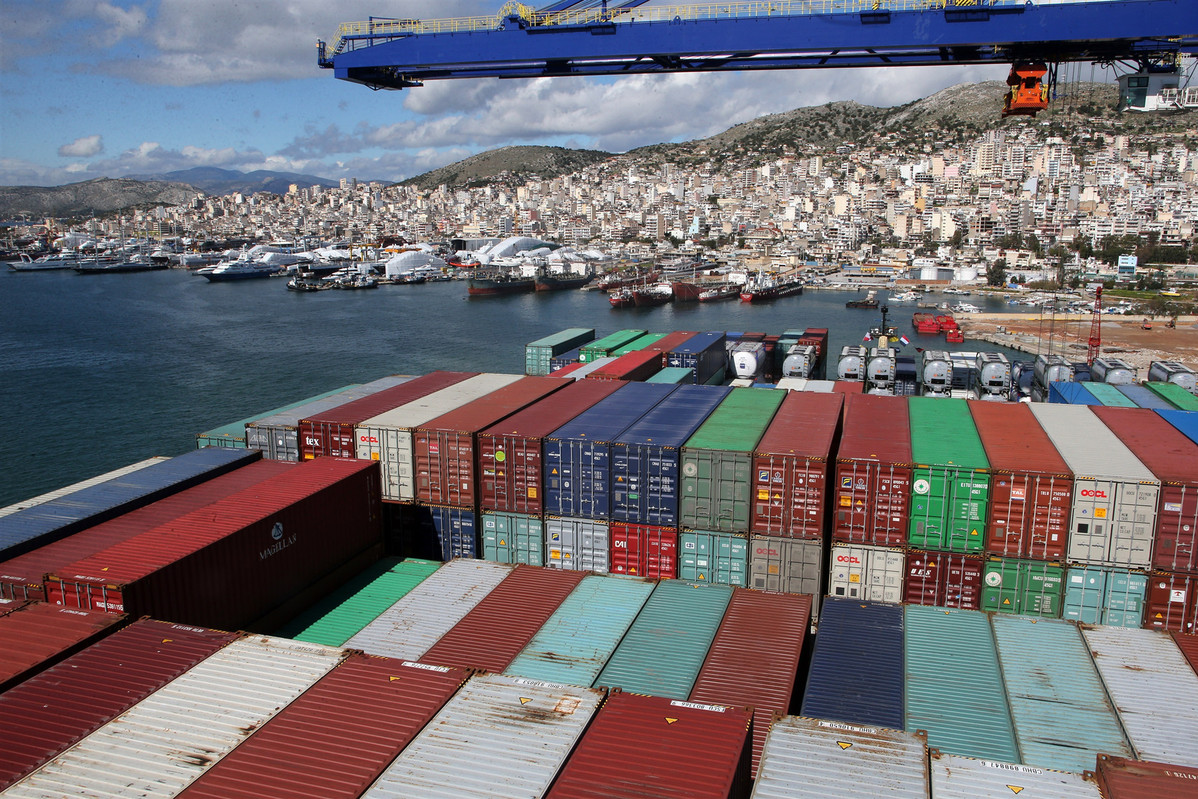 China COSCO Shipping containers stand at Piraeus. CHINA DAILY
China COSCO Shipping containers stand at Piraeus. CHINA DAILY
The US Federal Reserve has frequently raised the interest rate since 2015. This year it has raised the interest rate three times-and it is expected to raise it a fourth time this year.
The frequent interest rate hike is closely related to the US' good economic performance in recent years. Its GDP growth rates from 2015 to 2017 were 2.9 percent, 1.5 percent and 2.3 percent, respectively, and this year its economy is expected to grow by about 3 percent, which is unusual for the US. Also, the consumer price index remains stable between 2 percent and 3 percent, and the unemployment rate is down to about 4 percent.
The US' good economic performance has always caused large-scale capital to flow into the country. In April alone, more than $200 billion flowed into the US market, increasing to over $250 billion in June.
The US government has to raise interest rate to prevent its economy from overheating and forming bubbles. And by raising the interest rate now, the US will be in a better position to cope with the problems created by rapid economic growth, as well as to maintain the healthy economic growth momentum.
But the interest rate hike also prompts large-scale capital outflows from emerging markets to the US, as the latter's economies are relatively immature and unstable. And the emerging market economies can neither manage the large-scale capital inflow when the US eases the monetary policy nor curb large-scale capital outflow when the US tightens the monetary policy.
Capital outflow creates a series of troubles for emerging markets, including the slowing of economic growth. For example, it has led to the sharp devaluation of the currencies of emerging countries such as Venezuela, Turkey and South Africa, and forced some economies including Turkey, Argentina and Mexico to raise their interest rates to curb the outflow of capital. So some emerging economies may face a severe financial crisis if they do not take effective measures.
But even if the impact of the Fed's interest rate hike is undeniable, the fundamental problem lies in the emerging market economies themselves. For instance, some emerging economies lack the necessary economic diversity, so they are over-dependent on the world market for growth. These economies generally export raw materials and other resources while importing industrial goods on a large scale and therefore cannot balance their foreign trade.
Also, some emerging market economies' productivity is comparatively low, so they can hardly attract foreign capital for long-term investment. Take agriculture for example. The average per hectare grain output in Africa is only about 1.5 metric tons, 40 percent lower than the global average. Also, some emerging market economies practically don't have manufacturing industries, as a result they can hardly attract foreign investment, let alone guarantee good returns even in the long run.
Besides, since the current accounts of some emerging market economies are unbalanced-some even have huge deficits-they tend to incur heavy debts, while some of them have relatively small foreign exchange reserves due to the abovementioned reasons, which means they have a low financial risk resistance capacity.
In this regard, the Belt and Road Initiative offers a great opportunity to emerging market economies to enhance their economic strength.
First, by participating in the Belt and Road Initiative, they can improve their domestic infrastructure, which in turn can create more jobs, reduce transportation costs, promote trade growth and build a solid foundation for rapid economic growth.
Second, by engaging in international production capacity cooperation, one of the most important goals of the Belt and Road Initiative, the emerging market economies can accelerate their own industrialization process. As China is in the later stage of industrialization and has the world's largest manufacturing industry with the strongest production capacity, by cooperating with China under the framework of the initiative, the emerging market economies can use Chinese capital, technologies and market to develop their own industries, and adjust their economic structure, improve their industrial capacity and enhance their financial risk resistance capacity.
Third, the emerging market economies can better use China's huge market to promote domestic economic development through the Belt and Road Initiative.
And fourth, by participating in the Belt and Road Initiative, the emerging market economies can strengthen regional financial cooperation. In fact, the Asian financial crisis has made many countries realize the significance of building a regional financial cooperation framework.
Moreover, China has become the biggest investor in many emerging countries, and it should use this factor to further deepen cooperation with those countries under the framework of the Belt and Road Initiative, which will help improve their financial system while stabilizing both the regional and global financial markets .
The author is the director of Emerging Markets Institute, Beijing Normal University. The article is an excerpt from his speech at a recent seminar on "Fed rate hike and the impact on the emerging markets" at the Center for BRICS and Global Governance.